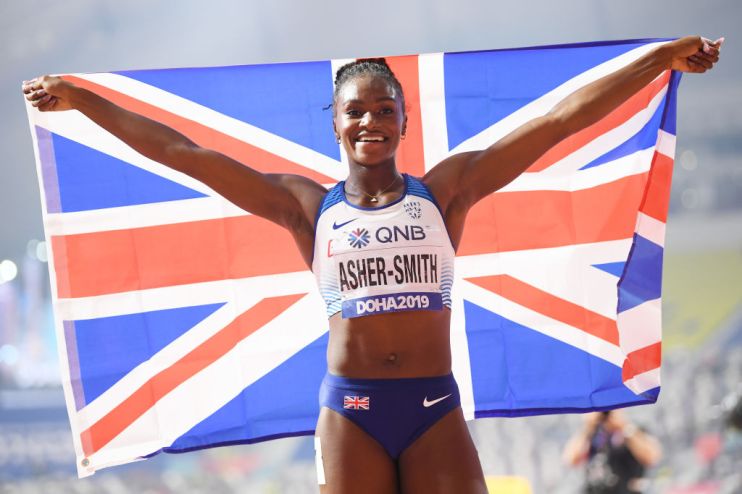Former UK Athletics chair Ed Warner: My heart says Team GB track and field stars can deliver against the odds at Tokyo 2020 Olympics

“Head not heart” was the mantra I lived by going into an Olympics, such is the jeopardy in international athletics.
With 214 member nations within World Athletics, experience says that Great Britain needs at least two genuine podium prospects for every medal the team might actually bring home from any global track and field competition.
On that rule of thumb, my head says this coming week in Tokyo, when athletics takes centre stage, looks a real challenge for Team GB.
I headed up UK Athletics through 13 major outdoor championships, including three Olympics.
When I started as Chair in 2007 I was urged to follow the Swedish model, as this smaller nation had four global stars – more than us at the time.
But as each retired, it became clear there was no model to follow, just a temporary alignment of the cosmos in Sweden’s favour. Instead, the sport was a numbers game.
To succeed over time, Britain needs a critical mass of athletes capable of reaching global finals and putting themselves in medal contention.
Then, an Olympics or World Championships becomes an exercise in the nation’s stars delivering and a few of its longer shots outperforming.
Some of my most enjoyable moments were the surprise successes – the late Germaine Mason’s stylish display to bag high jump silver in Beijing 2008 being the prime example.
Just don’t talk to me about dropped batons or other relay foul-ups.
British athletics team averages 4-8 medals at Olympics
Tokyo is the first Olympics possibly since Seoul ‘88 in which Britain doesn’t have a clear favourite in any event before the start of competition. (Was Linford Christie favourite for the 100m in Atlanta ’96 before his two false starts? Discuss).
Trawl through the official World Athletics rankings and this year’s performances stats and you’ll find top-three positions in either lists for only Dina Asher-Smith in both sprints, heptathlete Katarina Johnson-Thompson, Holly Bradshaw in the pole vault and the men’s 4x100m relay squad.
Someone close to the British team could this week reel off for me only half a dozen other genuine contenders aside from this clutch, most in the middle distance events – all of which will be fiercely competitive.
The depleted global athletics calendar in this pandemic season, plus the wildcard of new racing shoe technology, makes predictions in these events even more hazardous than usual.
The good news is that any Brit who squeezes through their semi final in the 800m or 1500m will feel they have a chance of a medal.
Take a sweep through the history books and you’ll see that, aside from the boycotted Olympics of Moscow ’80 and Los Angeles ’84, the British athletics team typically wins between four and eight medals, so you can see just how tight the maths is this time, and just how important it is that relay batons stick and they change hands within the permitted zones.
Good omen? GB’s young new head coach, former sprinter Christian Malcolm, was one of the coaching team behind the clean sweep of four relay medals at the London 2017 World Championships.
Oh, and if you are looking for a Brit to surprise, keep an eye on discus thrower Lawrence Okoye, who gave up a place at Oxford University to compete in London 2012, then left the sport for the San Francisco 49ers in the NFL and has just returned to athletics.
If Okoye nails his throws, he could be quite the prodigal son.
Team GB is a young squad – but their time is now
As to the current shoe arms race, an insider told me this week that although Nike has the edge in sprint shoes (British fans can take solace in Asher-Smith being a Nike athlete) its competitors have caught up and even moved ahead over the longer distances. The one-year delay to these Olympics has provided vital development time.
While records will doubtless fall as the new carbon fibre foot-plates help propel athletes forwards, it seems gripes about competitor shoe advantage will have little or no validity. The track is level. Doping – especially given the sharp fall in testing of athletes worldwide during the pandemic – is another matter entirely.
There will be a narrative around Team GB that this is a young squad primed to peak at Paris 2024. And there is an element of truth in that.
But many of the sport’s global stars are themselves young – pole vault sensation Mondo Duplantis and world record hurdler Sydney McLaughlin are both just 21 and middle distance prodigy Jakob Ingebrigtsen only 20 – and there is no guarantee that any athlete will be fit and in form in three years’ time.
So now is their moment, and my heart says this British team can deliver thrills in spite of the odds.
Ed Warner is the former chair of UK Athletics and current vice-chair of World Para Athletics. An investment banker, he is also a former chair of Grant Thornton and current chair of of derivatives exchange LMAX, Air Partner PLC, and two listed investment companies. Sign up to Ed’s blog at sportinc.substack.com
